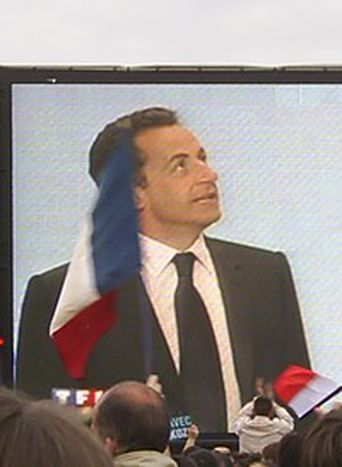
Victorious Sarkozy wakes France up
Published on
Translation by:
Nabeelah Shabbir'Tonight, France is back in Europe!' the newest sixth president of the fifth French republic told jubilant Parisian crowds on May 6
In a Europe of 27 member states, a national election shouldn't ruffle too many feathers. However, with 53% (the biggest majority ever received by the ruling right-wing UMP party) of the votes, Nicolas Sarkozy's presidential victory in France marks a turning point in the construction of Europe's future. The presidential elections which took place on 6 May 2007 refresh a nation which stepped into mass lethargy on May 29, 2005.
Coming back in
Voting 'no' to the European constitution – the drafting of which was overseen by former president Valéry Giscard d'Estaing in 2003 and 2004 – relegated Jacque Chirac's France to an awkward role on the EU stage. It re-dimensioned the relevance of a country which, along with Germany, is an important founding member of the European Union. In the last two years, no-one even seemed to know how to pick up from where everything was left off and relaunch the construction of the EU.
For example, in presenting a more liberal project in the economic plan. Neither the European Commission led by José Manuel Barroso, (who hasn't tried to be anything more than the honest broker between states that he proposed he would be when he took office in November 2004), nor Tony Blair's Great Britain. The latter succeeded in maintaining levels of Euroscepticism legendary to the nation. Neither could Germany offer a solution, a country which has only just kicked its way to the surface of the water, after its onerous reunification with its east.
'Tonight, France is back in Europe!' declared Sarkozy in his first triumphant speech as new president of the Gaullic nation. There's reason enough to believe him. Before beginning a hot autumn full of internal economic reforms (sure to be seasoned with street protests on the side), Sarkozy decided to get straight to the point concerning the European agenda.
Fillon-o-fish
 François Fillon, 53, Sarkozy's political advisor and rumoured future prime minister of France, is well-known for his unpopular pension system reform during his time as Minister of Labour in the 2002 government (he was overpassed for current PM de Villepin's government). He has made it known that the new president's first trips abroad will be to Brussels and Berlin. Sarkozy beams out the image of being a decisive man. He is a model leader for much of Europe's right-wing, and his confident charisma can shake up a dozing political continent, even if this drowsiness was caused by a French pill. So what's on Sarkozy's European cards?
François Fillon, 53, Sarkozy's political advisor and rumoured future prime minister of France, is well-known for his unpopular pension system reform during his time as Minister of Labour in the 2002 government (he was overpassed for current PM de Villepin's government). He has made it known that the new president's first trips abroad will be to Brussels and Berlin. Sarkozy beams out the image of being a decisive man. He is a model leader for much of Europe's right-wing, and his confident charisma can shake up a dozing political continent, even if this drowsiness was caused by a French pill. So what's on Sarkozy's European cards?
A Europe protecting against globalisation
'I entreat our European partners not to remain deaf to the anger of people who perceive the European Union not as a source of protection, but as the Trojan horse of all the threats that come with the changes in the world,' said Sarkozy in the same late-night victory speech to a partying crowd in Paris. A victory for Sarkozy is also the victory of a France which, in these elections, synonymously disavowed globalisation, as much in the far right as in the far left, instead opting for 'protection' from globalisation itself. Pure illusion?
No Turkey
'Turkey is a country of Asia Minor,' commented Sarkozy on May 2, during the live two-and-a-half-hour televised debate in the last days of the presidential campaign, where he came face to face with his Socialist rival, the at-times temperamental Ségolène Royal.
The definitive comment dealt a blow to the left-wing candidate. It was impossible to be clearer on the theme. Centre-right German Chancellor and Christian Democratic Union (CDU) leader Angela Merkel – who had to soothe anti-Turk tensions to be able to govern alongside the Socialists – reacted in a calmer fashion. The decision about Turkish membership to the EU won't be made before Sarkozy's five year mandate is up in 2012.
The constitution is dead – long live the mini-treaty
For Sarkozy, the constitutional treaty has already been rejected by the French. After 2005, no chance that it will ever be revived. In reality, what is considered 'dead' for the Élysée Palace's newest resident is the method of going about its ratification: namely, via a referndum. Sarkozy instead proposes a parliamentary approval of a 'mini-treaty'. It would be limited to the rules of the EU's institutional organisation, and eliminates the chapter on policies.
The conservative Poland of twin president and prime minister brothers Kaczyski, which has always been hostile to the constitution, is grateful. Having reduced the efforts of the compromise reached by the convention presided over by Giscard d'Estaing, it will be difficult to conclude a better agreement for the EU on its rocky path to federalism. If Sarkozy were capable of the contrary, 6 May 2007 could then also be considered a victory for Europe.
In-text photo: Fillon for prime minister? (Photo: Fernando Navarro Sordo)
Translated from «Vince Sarkozy». E la Francia uscì dal letargo



